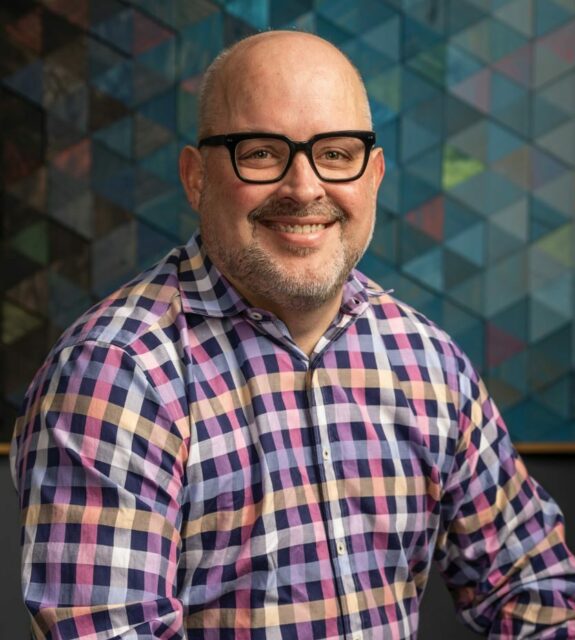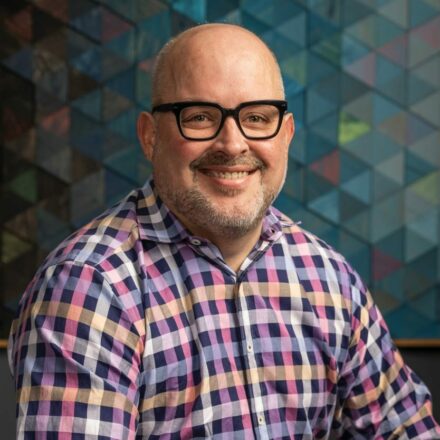In our “Ask me anything” series, Dell Technologies executives sit down with rising talent to answer questions about their career journeys, work-life balance and advice that’s guided them. Here, Matt Baker, SVP, corporate strategy, chats with Brad Ehler, marketing analyst.
Brad Ehler: Many young professionals struggle with imposter syndrome. What did you tell yourself when you faced moments of self-doubt throughout your career? How did you overcome that self-doubt and build the quiet confidence that you demonstrate in your leadership?
Matt Baker: Everyone struggles with imposter syndrome; I’m not sure you ever get over it. I still struggle with it from time to time. Like, how on earth did this weird kid with an English and political science degree from an average liberal arts school come to oversee corporate strategy at a Fortune 50 tech company? See what I mean? I wrote a piece on LinkedIn a few years ago about it and put forward a few observations:
- Our limitations are largely self-imposed, and we are capable of learning and excelling at far more than we think.
- Work every day to remove the shackles of self-doubt.
- That little voice in your head is the enemy. Never ever listen.

Your confidence will grow as you get more wins under your belt. Tuck away reminders of those wins, and look at them when that little voice of self-doubt creeps in. No better antidote!
I have heard Chuck Whitten say, “Don’t overdramatize mistakes or tough meetings.” He is absolutely right. We all make mistakes and face tough decisions; it’s what you do afterward to make things and yourself better that matters. Focus less on the emotion of a mistake or failure and more on learning from it.
Matthew McConaughey has a motto from way back: JKL,” just keep livin’.” That is cool, but for me, JKL means “just keep learning.”
How did you navigate the uncertainty of your career path? How did you know when you found the right next step to take, and what decision-making process went into selecting your next opportunity?
Growing up, I spent a lot of time on the ocean. Before LORAN and GPS, you had to spend time chart plotting—literally using paper charts, parallel rules and dividers to plot a course. (I am that old!) Trying to chart plot your career is a waste of time because every career is unique; there are no charts to plot on. Instead, careers require paying close attention and reading signs around you (e.g., if you see birds, you’re close to land—few birds actually live at sea).
Ask yourself about the utility of your current job to your career goals. Is your role moving you closer to your career objectives? Are you reading the signs of opportunity? With few exceptions, I progressed in my career by finding opportunities to add unique value. Take on new tasks, stretch yourself, make an impact. In almost 20 years at Dell, I’ve never applied to or sought a new role; I was tapped for new opportunities because I put myself out there, read the signs, took the risk, and “LAND HO!” I took on new roles. And this is not uncommon at Dell. Most of my closest and most successful colleagues navigated their careers this way. The least successful drive themselves crazy staring at the chart they’ve plotted. When they miss waypoints, they feel defeated. Staring at the chart blinds you to the opportunities all around you.
Ask yourself about the utility of your current job to your career goals. Is your role moving you closer to your career objectives? Are you reading the signs of opportunity? With few exceptions, I progressed in my career by finding opportunities to add unique value.
—Matt Baker, SVP, corporate strategy, Dell Technologies
For people struggling to find their passion, you recommend they stop searching. What do you mean by creating your passion, and how does this approach enable you to make the most of the opportunity at hand?
I’ve heard so many people talk about finding their passion, on a quest for some mythical occupation that unlocks an endless river of happiness. HARD NOPE. You create passion by engaging in what you are doing right now. There is no magical job we “deserve” where we’ll automatically feel fully self-realized. I believe that capability is within you today and likely accessible in whatever job you now occupy.
If you cannot engage your passion in place, you will likely miss the greatest career accelerator—demonstrated excellence. On the flip side, lacking passion about where you are at present is the fastest way to squander your opportunity to advance. Don’t settle but have a serious discussion with yourself about the root of your passion problem. You may be surprised by the answer. I have been, consistently.
What is one piece of conventional wisdom you would challenge? What alternative advice would you offer?
I have a reputation for being unconventional and consistently challenging conventional wisdom. It is a powerful tool. If you’re going to challenge conventional wisdom, you’ll need to develop a deeper understanding of what informs convention in the first place. That is where you will find essential truths. Said differently, if you are going to buck convention, you have to be deeply informed. Otherwise, you are just a doubting Thomas.
Many business schools encourage their graduates to plot their career course. My advice bucks that conventional wisdom. Here’s another: What’s the timeline for a practical quantum computer? I heard a very smart man (who is also known for bucking conventional wisdom) once say, “Quantum Computing will have a generational impact … I just can’t say which generation!”
What content medium most inspires you—music, podcasts, books, movies, TV shows? In what ways do you incorporate this source of inspiration into your daily life?
I love podcasts, but mostly for entertainment or lifelong learning. The pandemic turned me into a huge YouTube fanatic, and a lot of the channels I watch feature a creator with passion and resolve to make their channel thrive. Some examples: “Outdoor Boys” features a lawyer turned bushcraft/ fishing/ adventure creator. “The Fish Locker” is a retired British Navy guy who has turned his passion for fishing and shore foraging into a great source of practical knowledge. “Everyday Astronaut” has a passion for rocketry and created a channel that brings complex engineering down to earth. “Celebrating Appalachia” features a woman who takes a scholar’s approach to the traditions, language and foodways of Appalachia. In “Smarter Every Day,” a former ordinance engineer explores a wide variety of scientific and engineering challenges, from pecan-harvesting machines to the James Webb telescope to a supersonic baseball cannon.
I rattle all of these off because they take us back to my thesis on passion. YouTube is a window into some of the most passionate people in the world, and it inspires me and the passions I have in work and in life. “Smarter Every Day” and “Everyday Astronaut” are exquisite storytellers who make complex concepts simple and approachable. In my job as a strategist, I need that storytelling capability every day!
Note, there are few examples that focus on self-help or business. I don’t need that because I live it every day. I study people’s passions, their skill-building, their determination because I learn more from that than from guru texts on business. There are a few exceptions. I am a religious listener of Marketplace on NPR. Planet Money is always great and 100% focused on business and the economy. And I spend a lot of time reading industry news and blogs (I might be one of the last RSS holdouts!). If you want my Feedly list of RSS channels, I’m happy to share!
If you’re going to challenge conventional wisdom, you’ll need to develop a deeper understanding of what informs convention in the first place.
——Matt Baker, SVP, corporate strategy, Dell Technologies
As a leader, how do you drive culture remotely? In what ways do you help new team members immerse themselves in the company culture?
Great question, and it’s acutely important for business leaders. The pandemic taught us a ton of lessons about building and maintaining culture in a largely remote company.
The first is frequent and frank communications. I applaud Michael, Jeff and Chuck for embracing the challenge and showing us the way forward. We had and still have monthly senior leadership meetings, and they made it clear that we needed to do the same all the way through the organization.
Second, there is power in dispensing with pomp and pretense. Not that Dell had a lot of that to begin with, but seeing everyone as more human and approachable was a huge positive in my mind. I felt like I was welcomed into everyone’s home, and vice versa, and I think that had an impact. If it wasn’t obvious before, it’s pretty clear that Jeff Clarke really likes Whataburger. We know the cat people, the dog people, the bird people among us. I live up to my quirky reputation by working from a teardrop trailer in my yard (in the part of Austin where people Keep Austin Weird). I have never felt closer to my team, my leaders and everyone at Dell.
Third, remote networking is easier than we thought. Hopping on Zoom to chat with anyone about anything is easier than hoping you run into them in the hallway.
Last, I like to think I have a pretty casual and approachable reputation, and I know that has not always been the case. It has paid huge dividends in a remote work environment. I’ve been doing regular “ask me anything” sessions and open mic meetings, and it has been great to just get together and talk—about work or podcasts or YouTube channels.
What do you see as the greatest success of your career, and how did you accomplish this feat?
I am not done yet, so I can’t say! The best is yet to come, hopefully. My background is pretty unconventional. I was a middling to poor student. If it weren’t for very good friends in high school and college, life would have been pretty grim. If it weren’t for two amazing professors during my sophomore year in college, I wouldn’t have my confidence. Just being here and operating at this level is accomplishment enough for me. I show up every day proud of whoI have become, because at 21 years old, I would not have dreamed of getting here. I got here by showing up, squelching my self-doubt, taking risks to seize opportunities, staying true to myself and playing to my strengths: well-honed critical thinking skills, fearless questioning of conventional wisdom, and real-world experience as an IT practitioner.
Just being here and operating at this level is accomplishment enough for me. I show up every day proud of who I have become.
——Matt Baker, SVP, corporate strategy, Dell Technologies
Looking back at your unorthodox journey from temp IT worker to senior vice president, how do you think your path may have been altered by working remotely? What advice would you offer someone beginning their career in a remote or hybrid workplace?
I don’t see remote/hybrid as a disadvantage, period. Your ability to meet with people anywhere in the world at any time has never been easier. Leaders like me need to be sure that the playing field remains level as we become more hybrid and less fully remote. Think of it as an advantage, not a burden.
Read more “Ask me anything” interviews.

